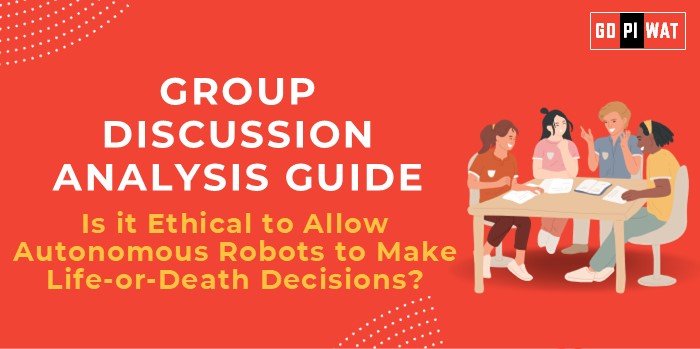📋 Group Discussion (GD) Analysis Guide
🌐 Is it Ethical to Allow Autonomous Robots to Make Life-or-Death Decisions?
🌟 Introduction to the Topic
Opening Context: “As AI technology rapidly evolves, autonomous robots capable of making life-or-death decisions challenge our ethical, philosophical, and legal frameworks. This debate intersects advancements in AI with fundamental human values.”
Topic Background: The concept of autonomous decision-making in life-or-death scenarios emerged with AI applications in healthcare, defense, and autonomous vehicles. While these technologies promise efficiency and potential lives saved, they raise profound ethical dilemmas about accountability, bias, and moral agency.
📊 Quick Facts and Key Statistics
- Autonomous Vehicles: Over 36,000 fatalities prevented yearly in the US could result from reducing human errors.
- Defense: Over 60 nations are exploring autonomous weapons systems for military operations.
- Healthcare AI: Error rates in AI diagnosis are 15% lower compared to human doctors for certain conditions.
- Moral Concern: Surveys reveal 70% of respondents express discomfort with robots making ethical decisions.
👥 Stakeholders and Their Roles
- Governments: Regulating and ensuring ethical AI deployment.
- Tech Companies: Innovating AI with ethical safeguards.
- Academia: Providing research and ethical guidelines.
- Global Organizations: Drafting international agreements on autonomous decision-making.
- Citizens: Debating acceptance and implications of such technology.
🏆 Achievements and Challenges
Achievements:
- Efficiency in Critical Decisions: Autonomous systems in healthcare deliver quicker triage in emergencies, potentially saving lives.
- Error Reduction: AI reduces biases in life-threatening diagnostics compared to human judgment.
- Global Efforts: International agreements like the “LAWS Convention” seek to regulate autonomous weapons.
Challenges:
- Moral Agency: Robots lack consciousness to understand ethical dimensions of decisions.
- Accountability Gaps: Unclear who bears responsibility for autonomous errors.
- Bias Amplification: Training data flaws can lead to fatal misjudgments.
🌍 Global Comparisons
- Proactive Regulation: European Union leads in ethical AI with clear guidelines.
- Laissez-Faire Approach: The US focuses on innovation over strict regulations.
📖 Case Studies:
- Healthcare Success: AI-driven surgery systems reduced complications by 30%.
- Defense Controversy: Autonomous drones used in Libya sparked global outcry.
📌 Structured Arguments for Discussion
- Supporting Stance: “Autonomous robots enhance efficiency, reducing human error in life-critical scenarios.”
- Opposing Stance: “Robots lack ethical reasoning, making them unsuitable for life-or-death decisions.”
- Balanced Perspective: “While robots improve efficiency, human oversight remains essential for ethical accountability.”
🗣️ Effective Discussion Approaches
- Opening Approaches:
- Statistical Opener: “Autonomous systems have demonstrated a 15% improvement in diagnostic accuracy compared to human counterparts.”
- Case Study: “Libya’s deployment of autonomous drones raised critical ethical questions globally.”
- Philosophical Angle: “Should entities without moral agency dictate who lives or dies?”
- Counter-Argument Handling:
- Highlight systemic safeguards as potential solutions to accountability gaps.
- Emphasize the necessity for a human-AI collaborative framework.
🧩 Strategic Analysis of Strengths and Weaknesses
- Strengths: Efficiency, error reduction, scalability.
- Weaknesses: Lack of moral reasoning, accountability gaps.
- Opportunities: Improved regulation, public awareness.
- Threats: Loss of trust, misuse in military applications.
📈 Connecting with B-School Applications
- Real-World Applications: Projects exploring the integration of AI ethics in management decisions.
- Sample Interview Questions:
- “How would you regulate the use of AI in critical decision-making?”
- “Discuss a business model for ethical AI integration in healthcare.”
- Insights for B-School Students:
- Understanding ethical AI can shape policy-driven leadership.
- Expertise in AI regulations is a valuable skill in consulting.


